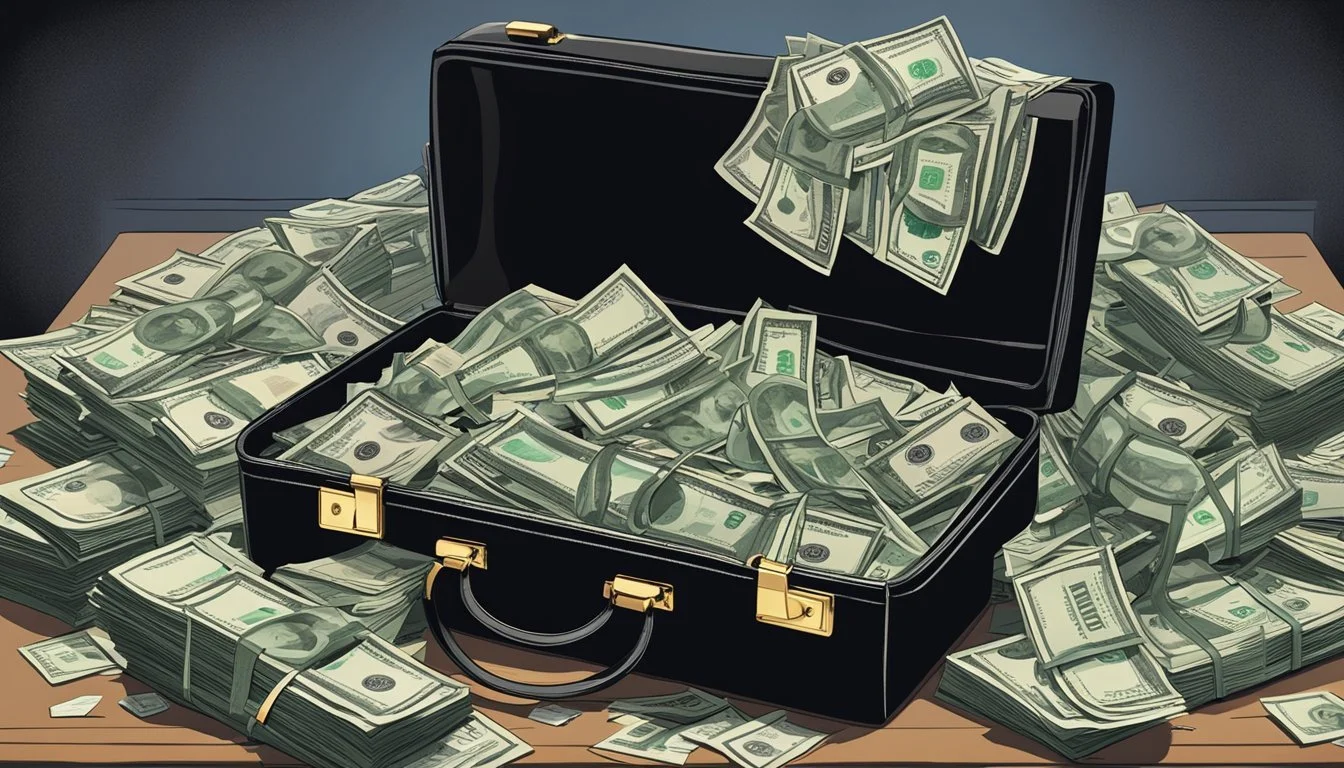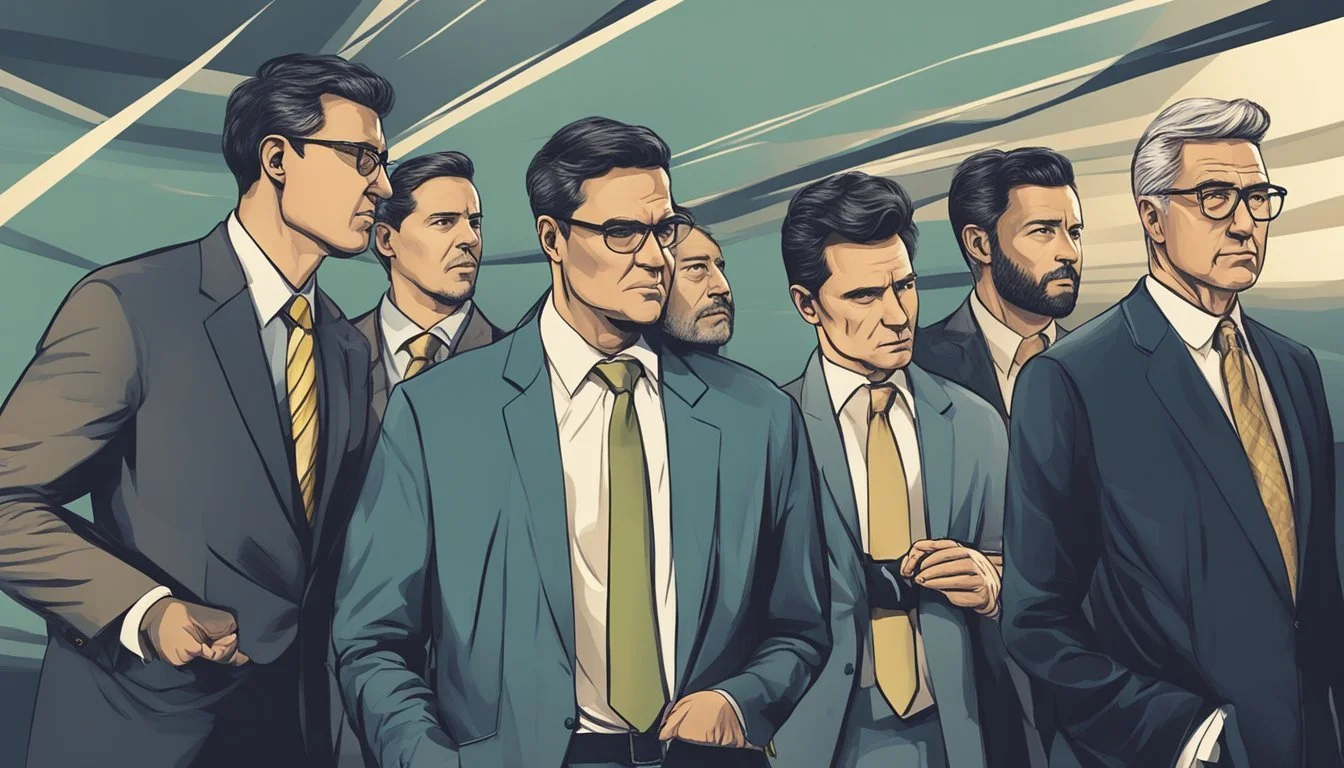11 Compelling Documentaries on High-Profile Insider Trading Cases
Wall Street's Hidden Scandals Exposed
Insider trading scandals have rocked financial markets and captivated public attention for decades. These high-stakes cases of illegal profiteering based on non-public information reveal the darker side of Wall Street and corporate America. Documentaries exploring major insider trading scandals provide viewers with an in-depth look at the motivations, methods, and consequences of these financial crimes.
From hedge fund titans to celebrity entrepreneurs, insider trading cases have ensnared a diverse cast of characters over the years. Filmmakers have chronicled some of the most infamous and impactful instances, shedding light on complex schemes that undermined market integrity. These documentaries combine expert analysis, interviews, and dramatic reenactments to break down the intricate details of headline-grabbing financial crimes.
1) Enron: The Smartest Guys in the Room
"Enron: The Smartest Guys in the Room" is a 2005 documentary film that examines the collapse of Enron Corporation. The film is based on the best-selling book by Fortune reporters Bethany McLean and Peter Elkind.
Directed by Alex Gibney, the documentary delves into one of the most notorious corporate scandals in American history. It chronicles Enron's meteoric rise and spectacular fall, which led to criminal trials for several top executives.
The film explores how Enron, once the seventh-largest company in the United States, became embroiled in a web of financial fraud and corruption. It reveals the complex accounting practices and insider trading schemes that ultimately led to the company's downfall.
Through interviews and archival footage, the documentary sheds light on the key players involved in the scandal. It examines the roles of executives like Kenneth Lay and Jeffrey Skilling in perpetrating the fraud.
The film also investigates Enron's involvement in the California energy crisis, which artificially inflated utility prices at the expense of consumers. It serves as a cautionary tale about corporate greed and the dangers of unchecked power in the business world.
2) Inside Job
"Inside Job" is a powerful documentary that examines the 2008 financial crisis. Directed by Charles Ferguson and narrated by Matt Damon, the film offers a comprehensive look at the events leading up to the global economic meltdown.
The documentary explores the complex web of relationships between Wall Street, Washington, and academia. It argues that deregulation and conflicts of interest played significant roles in the crisis.
Ferguson's film features interviews with key figures in finance and economics. These include Nouriel Roubini and Christine Lagarde, providing diverse perspectives on the crisis.
"Inside Job" is known for its clear explanation of complex financial concepts. It breaks down the intricate details of the crisis in a way that is accessible to general audiences.
The film's investigation extends beyond the United States. It examines how the crisis affected other countries, including Iceland, highlighting the global impact of Wall Street's actions.
"Inside Job" received critical acclaim for its thorough analysis and compelling narrative. It won the Academy Award for Best Documentary Feature in 2011, cementing its place as a definitive account of the financial crisis.
3) The China Hustle
"The China Hustle" exposes a massive financial fraud involving Chinese companies listed on U.S. stock exchanges. This 2017 documentary, directed by Jed Rothstein, uncovers the deceptive practices used to inflate company values and mislead investors.
The film follows Dan David, a financial investigator, as he uncovers the fraudulent activities of Chinese firms. These companies exploit loopholes in U.S. securities regulations to gain access to American capital markets through reverse mergers.
"The China Hustle" reveals how these companies grossly exaggerate their revenues and assets to attract unsuspecting investors. The documentary highlights the complicity of various parties, including investment banks, auditors, and regulators.
Through interviews with whistleblowers, investors, and experts, the film paints a troubling picture of widespread financial fraud. It demonstrates how this scheme affects not only individual investors but also pension funds and the broader economy.
The documentary serves as a cautionary tale about the risks of investing in foreign companies and the importance of due diligence. It also raises questions about the effectiveness of financial regulations and oversight in an increasingly globalized economy.
4) Wall Street: Money Never Sleeps
"Wall Street: Money Never Sleeps" is a 2010 sequel to the iconic 1987 film "Wall Street." The movie revisits the world of high finance and insider trading two decades after the original.
Directed by Oliver Stone, the film stars Michael Douglas reprising his role as Gordon Gekko. Shia LaBeouf plays Jake Moore, a young trader who becomes entangled in Gekko's schemes.
The documentary explores the aftermath of the 2008 financial crisis. It depicts the complex relationships between banks, regulators, and traders in the modern financial landscape.
Insider trading remains a central theme in the film. The characters navigate a world where information is power and ethical boundaries are often blurred.
The movie provides insight into the evolution of Wall Street culture. It showcases how technology and new financial instruments have changed the trading landscape since the 1980s.
"Money Never Sleeps" serves as both entertainment and a commentary on the persistent issues in the financial sector. It highlights the ongoing relevance of insider trading concerns in the modern era.
5) Dirty Money: Payday
"Dirty Money: Payday" is an episode from the Netflix documentary series that exposes the predatory practices of the payday loan industry. The film focuses on Scott Tucker, a former race car driver who built a multi-billion dollar empire through his payday loan businesses.
The documentary reveals how Tucker's companies exploited vulnerable borrowers by charging exorbitant interest rates and fees. It details the complex web of shell companies and legal maneuvers Tucker used to evade regulations and maximize profits.
Viewers gain insight into the inner workings of Tucker's operation, including deceptive marketing tactics and aggressive collection methods. The film also explores the broader implications of the payday loan industry on low-income communities.
Through interviews with former employees, regulators, and victims, "Dirty Money: Payday" paints a disturbing picture of financial exploitation. The episode culminates with Tucker's eventual downfall, as federal authorities crack down on his illegal business practices.
This documentary serves as a cautionary tale about the dangers of unregulated lending and the human cost of corporate greed. It sheds light on an often-overlooked form of financial misconduct that affects millions of Americans.
6) The Wolf of Wall Street
"The Wolf of Wall Street" is a 2013 biographical black comedy film directed by Martin Scorsese. It stars Leonardo DiCaprio as Jordan Belfort, a stockbroker who engages in fraud and corruption on Wall Street.
The film is based on Belfort's memoir of the same name, detailing his rise and fall in the financial world. It showcases the excessive lifestyle and illegal activities that were rampant in his firm, Stratton Oakmont.
While not a traditional documentary, "The Wolf of Wall Street" offers a dramatized portrayal of real events. It provides insight into the culture of greed and excess that can lead to financial crimes.
The movie depicts various forms of market manipulation and securities fraud. It illustrates how these illegal practices can yield enormous profits while causing significant harm to investors and the economy.
DiCaprio's performance brings Belfort's story to life, showing the allure and dangers of unchecked ambition in the financial sector. The film serves as a cautionary tale about the consequences of insider trading and other white-collar crimes.
7) Rogue Trader
"Rogue Trader" is a compelling documentary that delves into the infamous Barings Bank scandal of the 1990s. The film focuses on Nick Leeson, a derivatives trader whose unauthorized speculative trading led to the collapse of Britain's oldest merchant bank.
The documentary provides a detailed account of Leeson's rise through the ranks at Barings Bank and his subsequent fall from grace. It explores how he managed to conceal massive losses through a secret error account while continuing to make increasingly risky trades.
Viewers gain insight into the high-pressure world of financial trading and the psychological factors that drove Leeson to take such extreme risks. The film examines the lack of oversight and internal controls at Barings that allowed his fraudulent activities to go undetected for so long.
"Rogue Trader" serves as a cautionary tale about the dangers of unchecked ambition and the potential consequences of lax financial regulations. It highlights the devastating impact that one individual's actions can have on an entire institution and the broader financial system.
Through interviews with key figures and reenactments of crucial events, the documentary offers a gripping narrative of one of the most infamous cases of financial fraud in modern history.
8) Chasing Madoff
"Chasing Madoff" is a 2010 documentary that chronicles the decade-long pursuit of Bernie Madoff by financial analyst Harry Markopolos. The film provides an in-depth look at one of the most notorious insider trading scandals in history.
Directed by Jeff Prosserman, the documentary showcases Markopolos' tireless efforts to expose Madoff's $65 billion Ponzi scheme. It reveals how Markopolos and his team meticulously gathered evidence and repeatedly alerted the Securities and Exchange Commission (SEC) to no avail.
The film combines interviews, reenactments, and archival footage to create a compelling narrative. It highlights the frustration and personal toll experienced by Markopolos during his investigation.
"Chasing Madoff" also explores the widespread impact of Madoff's fraud on investors and the financial industry. It raises questions about regulatory oversight and the challenges of detecting sophisticated financial crimes.
The documentary serves as a cautionary tale about the dangers of unchecked greed and the importance of vigilance in the financial sector. It offers viewers a unique perspective on the complexities of white-collar crime and the persistence required to uncover it.
9) To Catch a Trader
"To Catch a Trader" is a FRONTLINE documentary that offers an in-depth look at the U.S. government's crackdown on insider trading. The film, produced by the team behind "The Untouchables" and "Money, Power and Wall Street," provides a compelling narrative of the seven-year investigation.
The documentary features exclusive footage of hedge fund titan Steven A. Cohen and incriminating FBI wiretaps of other traders. It offers viewers a rare glimpse into the world of high-stakes Wall Street trading and the efforts to combat illegal practices.
Correspondent Martin Smith takes audiences inside the investigation, interviewing both Wall Street insiders and Justice Department officials. This balanced approach provides a comprehensive view of the complex issues surrounding insider trading.
The film explores the challenges faced by prosecutors in their attempts to curb insider trading on Wall Street. It highlights the reversal of two high-profile convictions, which may have implications for future cases.
"To Catch a Trader" aired on PBS, offering viewers a detailed examination of a significant financial scandal. The documentary serves as an educational tool, shedding light on the intricacies of insider trading investigations and their impact on the financial industry.
10) The Great Hack
The Great Hack is a 2019 Netflix documentary that examines the Cambridge Analytica scandal. Directed by Jehane Noujaim and Karim Amer, the film explores how personal data has become a valuable commodity in the digital age.
The documentary focuses on the controversial use of Facebook user data by Cambridge Analytica during political campaigns. It features interviews with key figures involved in the scandal, including former Cambridge Analytica employees and affected individuals.
The Great Hack provides insight into the methods used to gather and exploit personal information for targeted political advertising. It raises important questions about data privacy, digital rights, and the ethical implications of using personal information for manipulation.
While not specifically about insider trading, the film touches on related themes of information misuse and corporate misconduct. It highlights the potential for abuse when companies have access to vast amounts of personal data.
The documentary premiered at the 2019 Sundance Film Festival and received critical acclaim for its timely exploration of digital privacy issues. It serves as a cautionary tale about the power of big data and its potential impact on democratic processes.
11) American Greed: Big Lies, Big Trouble
"American Greed" is a documentary series that explores some of the most notorious financial crimes in history. The show dives deep into cases of insider trading, providing viewers with detailed accounts of how these schemes unfold.
One episode focuses on Raj Rajaratnam, a prominent hedge fund manager involved in a major insider trading scandal. Rajaratnam's case stands out due to its scale, with illegal profits estimated at $75 million.
The series examines how Rajaratnam built his empire and the methods he used to obtain confidential information. It also highlights the investigation that led to his downfall and subsequent conviction.
"American Greed" presents these complex financial crimes in an accessible manner. The show combines interviews, reenactments, and expert analysis to paint a comprehensive picture of each case.
By exploring high-profile insider trading scandals, the series sheds light on the darker side of Wall Street. It serves as both a cautionary tale and an educational tool for viewers interested in financial markets and white-collar crime.
Historical Context of Insider Trading
Insider trading has a long and complex history in financial markets. Laws and regulations have evolved significantly over time to address this practice and its impact on market fairness and integrity.
The Origins of Insider Trading Laws
The concept of insider trading emerged in the early 20th century. The Securities Exchange Act of 1934 marked the first major attempt to regulate insider trading in the United States. This act established the Securities and Exchange Commission (SEC) to oversee and enforce securities laws.
Initially, insider trading was not explicitly defined or prohibited. The SEC relied on Rule 10b-5, which broadly prohibited fraud in securities transactions. In 1961, the landmark case SEC v. Cady, Roberts & Co. established that corporate insiders had a duty to disclose material information or abstain from trading.
Key Changes and Amendments in Regulation
The Insider Trading Sanctions Act of 1984 increased penalties for insider trading violations. It allowed the SEC to seek civil penalties up to three times the profit gained or loss avoided.
The Insider Trading and Securities Fraud Enforcement Act of 1988 further strengthened regulations. This act expanded liability to controlling persons and increased criminal penalties. It also established a bounty program for informants.
In 2000, the SEC adopted Regulation FD (Fair Disclosure) to prevent selective disclosure of material information. This rule aimed to level the playing field for all investors by requiring public companies to disclose material information to all investors simultaneously.
Impact on Financial Markets
Insider trading scandals have far-reaching consequences for financial markets, affecting everything from stock prices to investor confidence. These illicit activities can create ripple effects throughout entire economies.
Market Volatility and Investor Confidence
Insider trading cases often trigger significant market volatility. When news of illegal trading breaks, stock prices can fluctuate wildly as investors react to the information asymmetry. This volatility can persist for weeks or even months after the initial revelation.
Investor confidence takes a severe hit in the wake of insider trading scandals. Many retail investors feel the playing field is unfairly tilted against them, leading to a decrease in market participation. This reduced liquidity can further exacerbate price swings and market instability.
Regulatory bodies like the SEC work to restore faith in the markets by aggressively pursuing and prosecuting insider trading cases. However, rebuilding trust is a slow process that can take years.
Case Studies of Economic Repercussions
The Galleon Group scandal in 2009 offers a prime example of how insider trading impacts markets. When charges were filed against Raj Rajaratnam, the hedge fund's founder, it sparked a sell-off in numerous technology stocks. Companies like AMD and IBM saw their share prices drop sharply due to their connection to the case.
Another notable instance is the ImClone Systems insider trading scandal of 2001. The revelation of illegal trades by company insiders led to a 16% drop in ImClone's stock price in a single day. This sudden plunge affected not only ImClone shareholders but also rippled through the broader biotech sector.
These cases demonstrate how insider trading can erode billions in market value, damage entire industries, and undermine the integrity of financial systems.









